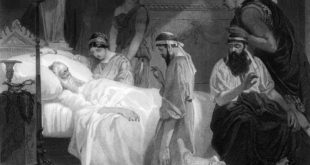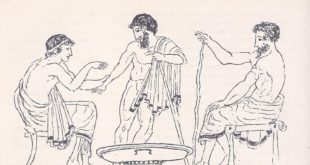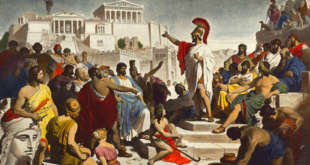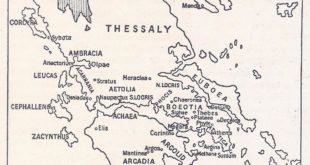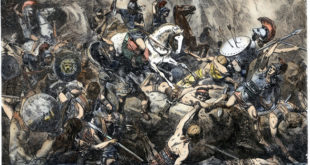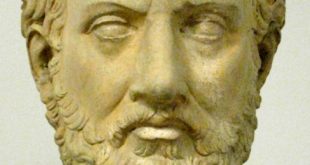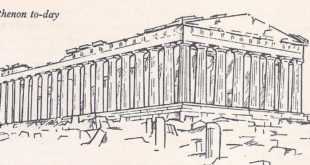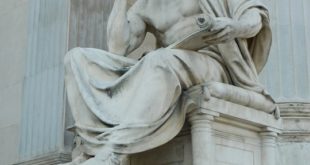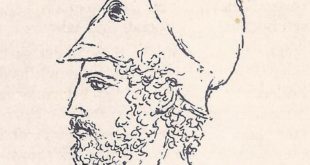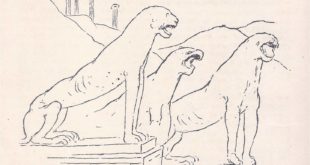Before Pericles dies, the morale in Athens was low. For the second year in succession the Spartans had been allowed to lay waste to the countryside. This alone would have embittered public opinion. Now, in addition, there was the plague. People began to talk about suing for peace. Criticism of Pericles, already sharp enough in the previous year, now reached a point where it had to be answered. Pericles tries to appeal to the patriotism of the Assembly and then to their common sense. He said: “Let us be frank. What we have established is a kind of dictatorship. Perhaps …
Read More »Hippocrates and Disease
In Hippocrates’ time, if death was the end, what could be done to stave it off? Deprived of what we would now call the comforts of religion, could the Athenian at least rely on an efficient medical service? Herodotus describes a doctor called Democedes who (in the 6th cent.) was hired by three states in turn – Aegina, Athens and Samos – each offering a higher salary than the last. So there may have been some sort of state medical service. Army doctors appear as early as “the Trojan War and a wounded Athenian in the Peloponnesian War would be …
Read More »Athenian Death
Athenian deaths were now a shadow of the past. When Aeschylus, in his play, the Persians, thanked the gods for the victory of Salamis, he was writing for an audience who still had religious faith, but in the years of prosperity which followed, although bigger statues of the gods and more splendid temples went on being put up, piety did not keep pace. On the contrary, the philosophers argued about the gods, Euripides made jokes about them in his plays and the ordinary man bothered much less about them, now that life had become so much safer and more prosperous. …
Read More »The Peloponnesian War Begins
The Peloponnesian War began because Pericles was running our of time. In the first place Athens insisted on backing Corcyra in a quarrel with Corinth (435). Corcyra was a Corinthian colony and the mother-city resented interference in the dispute, particularly since it brought Athenian ships round to the western coast of Greece where they could interfere with the trade route to southern Italy. The second trouble-centre was also a Corinthian colony, though a tribute paying member of the Athenian Empire — Potidaea in Thrace. Now that Athens saw trouble brewing with Corinth she insisted (432) that Potidaea should get rid of …
Read More »Why Did Athens Fight Sparta
In spite of the fact that they had fought as allies against Persia, Sparta and Athens did not like each other any better when the war was over. In 478, when the Athenians started to rebuild their fortifications, Sparta objected and Themistocles had to arrange for negotiations to drag on until the walls were finished. There followed the Spartan failure to lead the Ionians against Persia, while Athens founded the Delian League. In 464 the long dreaded revolt of the Helots began, following an earthquake which had laid the town of Sparta in ruins. After some savage fighting the Helots …
Read More »Thucydides
When Herodotus read his history in public, it is said that a youth called Thucydides was so moved that he burst into tears. Herodotus congratulated the young man’s father upon having so appreciative a son. Thucydides grew to be a rich man. He owned gold mines in Thrace. During the Peloponnesian War he commanded a squadron of Athenian ships but, having failed to accomplish the mission assigned to him, he went into exile (424). He used his enforced leisure to work on a history of the war which he had planned. He only reached 411 (the War went on till 404), …
Read More »The Parthenon
In the year 437 the Parthenon, which had been begun ten years before, was far enough advanced to contain a gigantic statue of Athena by the sculptor Pheidias. Enough of the Parthenon still survives to give an idea of how it must have looked when it was new and a visit to the British Museum will fill in the details. Here some of the sculptured figures which adorned the temple may be seen. They are known as the ‘Elgin Marbles’ because Lord Elgin brought them back from Greece in 1802-4 to save them from Turks, who then ruled the Greeks. …
Read More »Herodotus, The Father of History
In 445, if tradition can be trusted, the Athenians must have felt more self-confident than ever; for it was then that Herodotus came to Athens, read aloud his history of the Persian wars and was given a reward. That the Athenians should have listened with interest as well as gratification is not surprising. The historian had done full justice to their distinguished part in the Persian Wars and in addition his work (9 books in all) contained all sorts of interesting details about countries like Egypt and Scythia (south Russia) which were only remotely connected with the war. Herodotus had …
Read More »The Athenian Empire
Cimon was rich and pro-Spartan, but generous. He kept open house and invited the public to make use of his garden and grounds. It was said that he got riches that he might use them and used them that he might get honour by them. This was in fact the course which Athenian Empire herself now began to adopt; but Cimon was not destined to steer her along it. He had a rival, Pericles. In 461 the queer process of ostracism was once again brought into operation. (For the events leading up to this see) Every citizen scratched a name …
Read More »The Confederacy of Delos
Delos a Greek island in the Cyclades archipelago was an important religious centre in the Archaic and Classical periods. The island was also a major commercial and trading centre in the 2nd and 1st centuries CE. About the same time as the land victory at Plataea (479) the Greek fleet had beaten the Persians at Mycale on the coast of Asia Minor (478) and now that they were absolutely sure which was the winning side the Ionian Greeks of the coast and the islands gradually decided to change sides again, but they needed help. Persian garrisons had to be driven out. The Spartans might have …
Read More »